人教新目标(Go for it)版八年级下册Unit 1 What's the matter? Section A (3a-3c)课件(共39张PPT)
文档属性
| 名称 | 人教新目标(Go for it)版八年级下册Unit 1 What's the matter? Section A (3a-3c)课件(共39张PPT) | 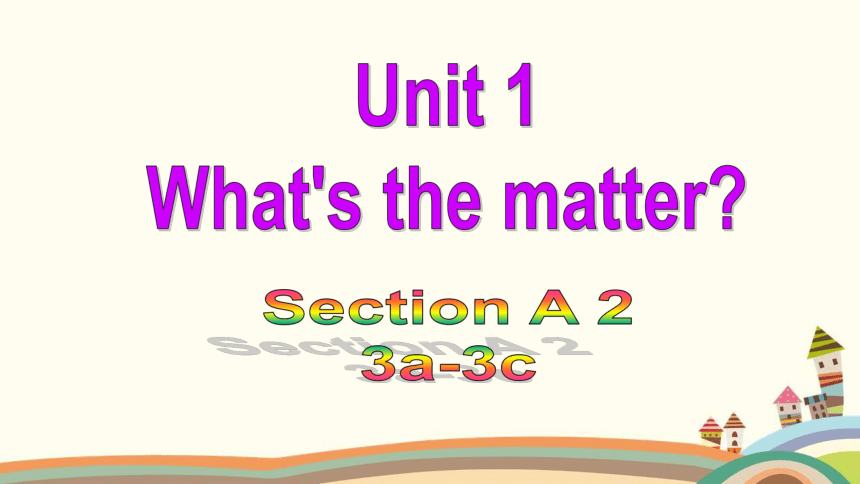 | |
| 格式 | ppt | ||
| 文件大小 | 1.9MB | ||
| 资源类型 | 教案 | ||
| 版本资源 | 人教新目标(Go for it)版 | ||
| 科目 | 英语 | ||
| 更新时间 | 2022-11-02 08:28:14 | ||
图片预览

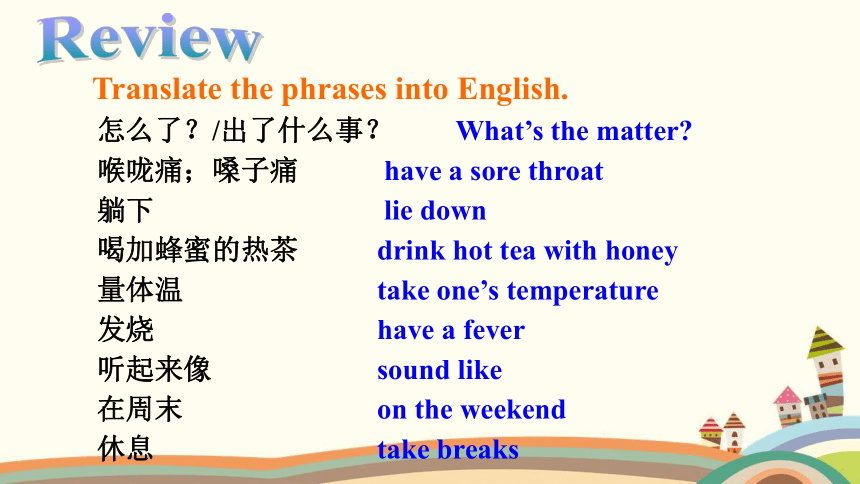
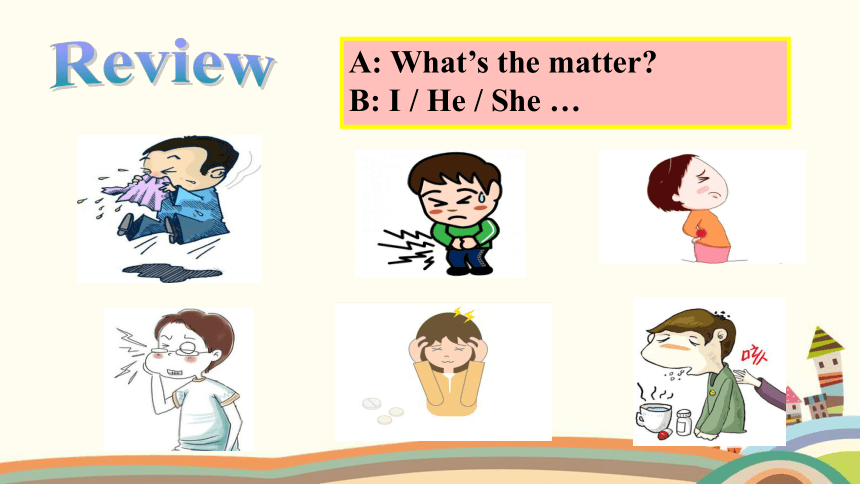
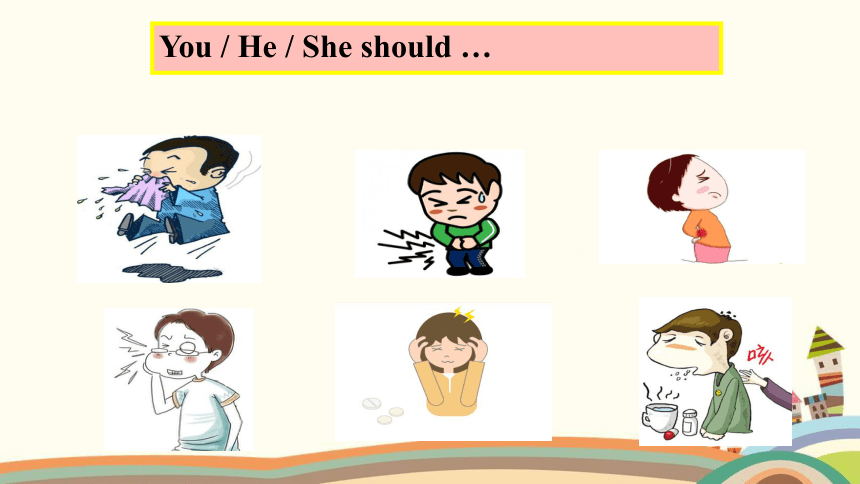
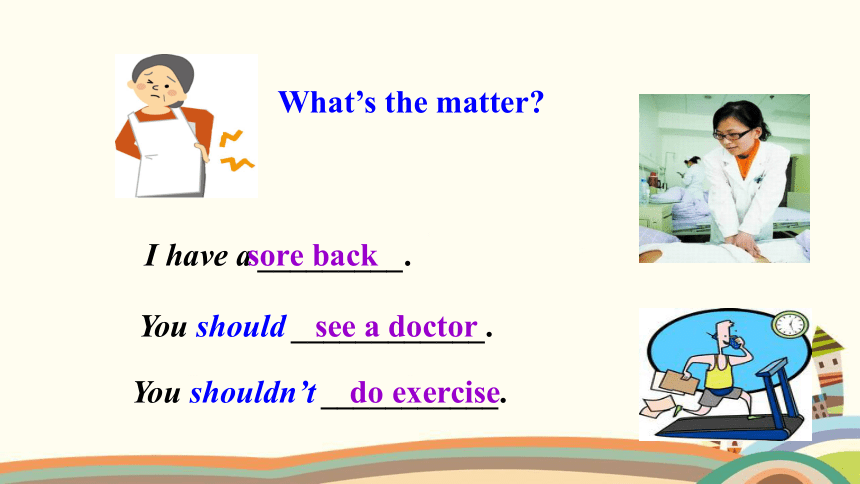
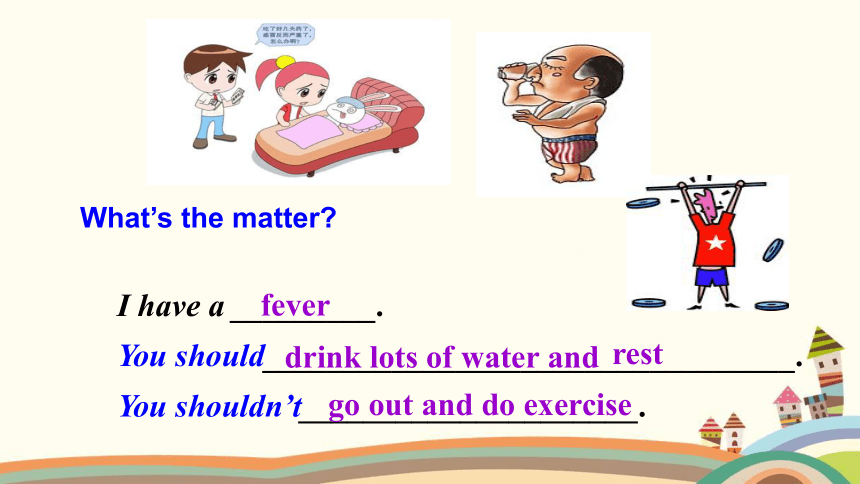
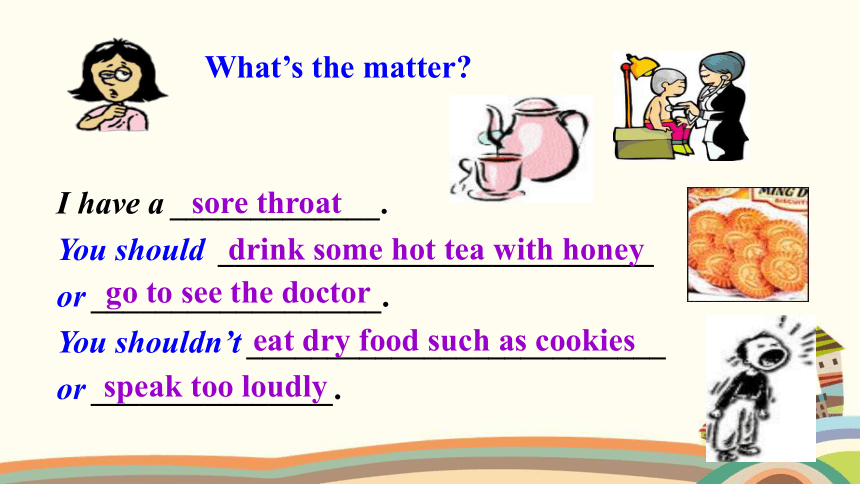
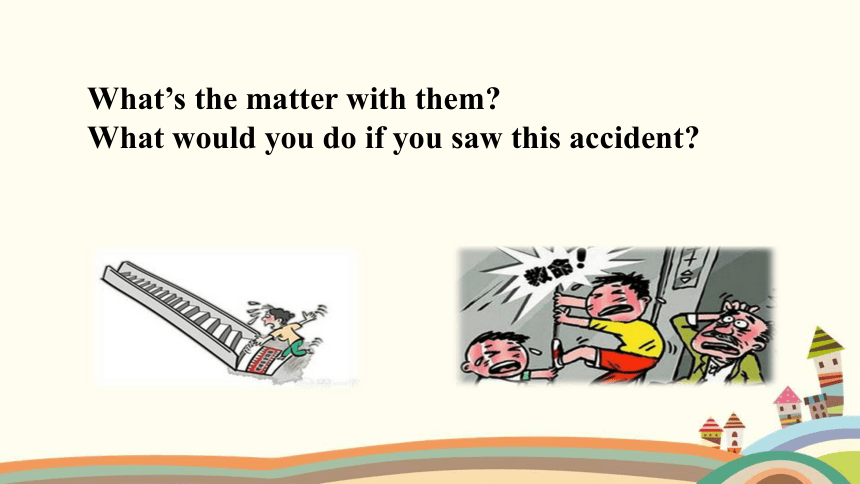
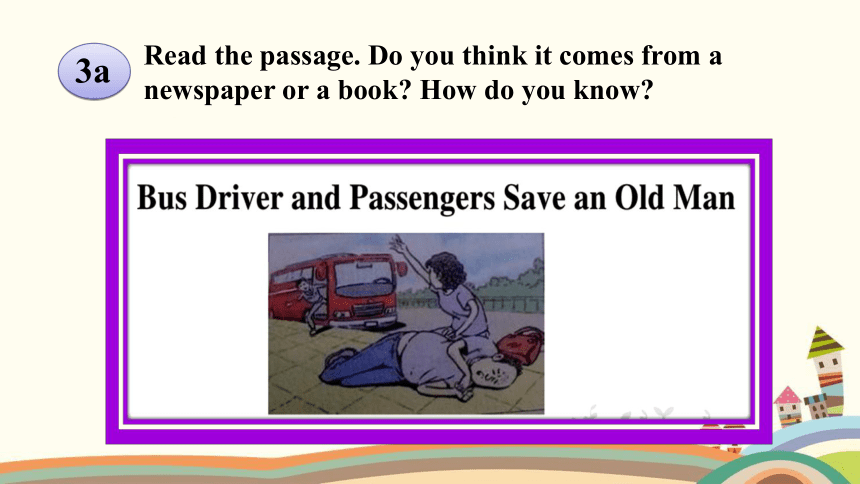
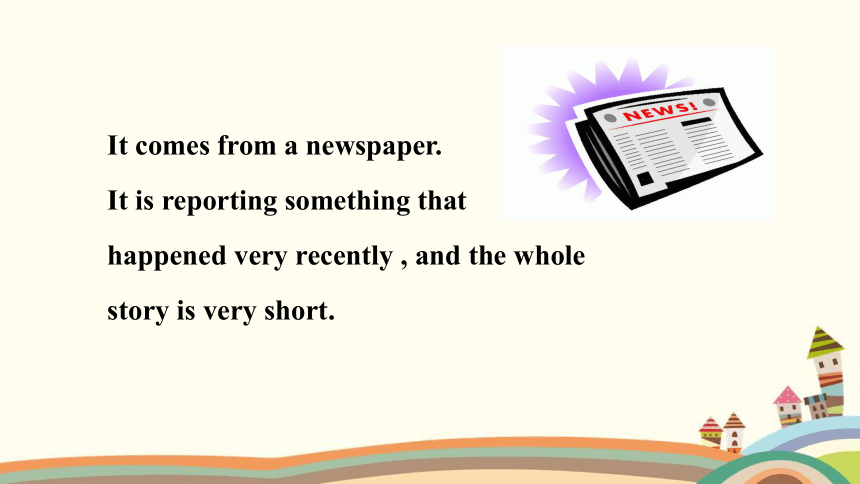
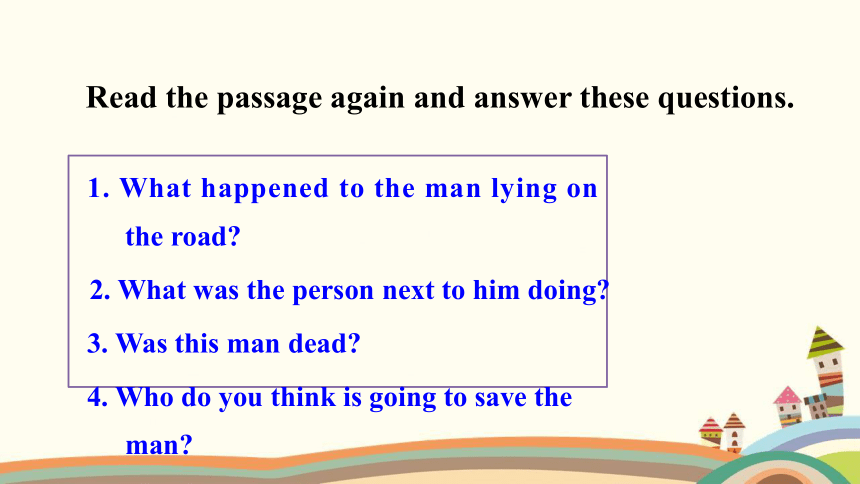
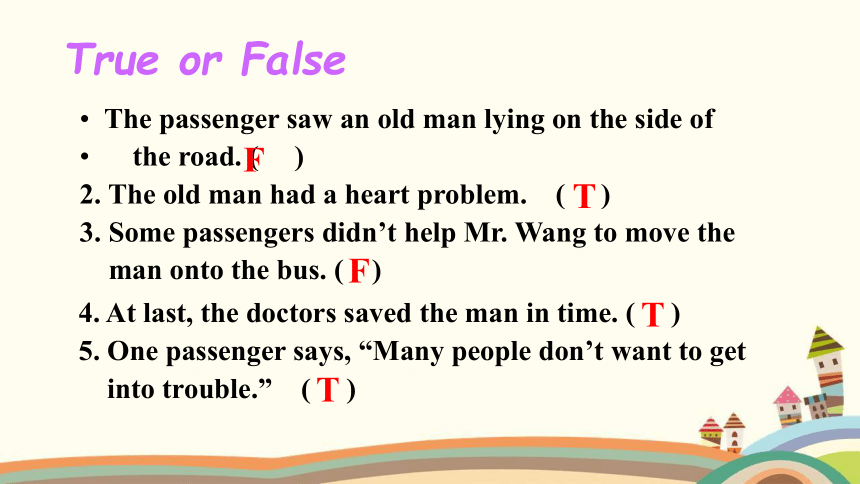
文档简介
(共39张PPT)
Translate the phrases into English.
怎么了?/出了什么事?
喉咙痛;嗓子痛
躺下
喝加蜂蜜的热茶
量体温
发烧
听起来像
在周末
休息
What’s the matter
have a sore throat
lie down
drink hot tea with honey
take one’s temperature
have a fever
sound like
on the weekend
take breaks
A: What’s the matter
B: I / He / She …
You / He / She should …
What’s the matter
I have a _________.
sore back
You should ____________.
see a doctor
You shouldn’t ___________.
do exercise
I have a _________.
You should_________________________________.
You shouldn’t_____________________.
fever
go out and do exercise
drink lots of water and
rest
What’s the matter
I have a _____________.
You should ___________________________
or __________________.
You shouldn’t __________________________
or _______________.
sore throat
drink some hot tea with honey
go to see the doctor
eat dry food such as cookies
speak too loudly
What’s the matter
What’s the matter with them
What would you do if you saw this accident
Read the passage. Do you think it comes from a newspaper or a book How do you know
3a
It comes from a newspaper.
It is reporting something that happened very recently , and the whole story is very short.
1. What happened to the man lying on the road
2. What was the person next to him doing
3. Was this man dead
4. Who do you think is going to save the man
Read the passage again and answer these questions.
True or False
The passenger saw an old man lying on the side of
the road. ( )
2. The old man had a heart problem. ( )
3. Some passengers didn’t help Mr. Wang to move the
man onto the bus. ( )
F
T
F
4. At last, the doctors saved the man in time. ( )
5. One passenger says, “Many people don’t want to get
into trouble.” ( )
T
T
Read the passage again and check (√) the things that happened in the story.
1. ____ Wang Ping was the driver of bus No. 26 at 9:00 a.m. yesterday.
2. ____ Bus No. 26 hit an old man on Zhonghua Road.
3. ____ The old man had a heart problem and needed to go to the
hospital right away.
√
√
3b
4. ____ The passengers on the bus did not want to go to the hospital,
so only Wang Ping went with the woman and old man.
5. ____ Some passengers helped to get the old man onto the bus.
6. ____ The old man got to the hospital in time.
√
√
1. At 9:00 a.m., bus No. 26 was going along … when the driver saw an old man lying on the side of the road.
bus No. 26 was going along …是过去进行时态,表示在过去某一时刻正在进行或发生的动作。
e.g. I was doing my homework at 9 o’clock p.m. last Sunday.
上个星期天晚上九点我正在做家庭作业。
Language points
(2017年四川成都)
--Did you hear someone knock at the door just now
-- Sorry. I ______ to my friend on the phone.
A. was talking B. talked C. am talking
A
解析:根据问句中的did和just now可知道事情发生在过去。当别人在敲门时,“我” 正在和朋友通电话。因此用过去进行时。A项正确。
when常常用来引导时间状语从句,当放在过去进行时构成的主句之后时,表示主句动作发生的过程中,另一个意想不到的动作发生了。
e.g. I was thinking of this when I heard my name called.
我正想着这件事时,突然听到有人叫我的名字。
We were playing outside when it began to rain.
我们正在外边玩,这时下起雨来了。
the driver saw an old man lying on …
是固定结构,即see sb. doing sth. 意思是“看到某人正在做某事或正处于某种状态”
e.g. I saw him working in the garden yesterday.
昨天我见他正在花园里干活。
(强调“我见他正干活”这个动作)
(2016·内蒙呼和浩特)
---I tried to make Alice _____ her mind but I found it difficult.
---Well, I saw you ____ that when I went past.
A. changed, do B. changes, doing
C. change, to do D. change, doing
D
解析:根据固定短语make sb. do sth.可以确定第一个空用动词原形。当我路过时看到你正在做某事,因此是see sb. doing sth。D项正确。
注意:
感官动词 see, watch, observe, notice, hear,
look at, listen to, smell, taste, feel +doing 表示动作的连续性、进行性
感官动词 see, watch, observe, notice, hear,
look at, listen to, smell, taste, feel + do 表示动作的完整性、真实性
I saw him work in the garden yesterday.
昨天我看见他在花园里干活了。
(强调“我看见了”这个事实)
1). She saw a boy _______ (go) into your classroom.
她看见一个男孩进了你们的教室。
2). I saw him _________ (walk) in the street.
我看见他正在街上散步。
3). The teacher heard Jim ________ (read) English when
she came in.
老师进来时,听见Jim在读英语。
go
walking
reading
Practice
2. … without thinking twice.
think twice 认真思考; 三思
I must think twice before I can promise.
在我答应之前,我必须重新考虑一下。
Please think twice about my suggestion.
请你认真考虑考虑我的建议。
3. He got off and asked …
get off 下车;出发;动身
Get off at the next stop and take a bus for the airport.
在下一个车站下车并乘公共汽车去机场。
What time will you get off tomorrow
你明天什么时候动身
(2016·新疆乌鲁木齐)
This bus doesn’t go to the train station. I’m afraid you have to _____ at Honghen stop and take BRT Line 1.
A. take off B. put off
C. get off D. get out
C
get on 上 车
get out 出来
get up 起床
get back 回来
get on / along with 与……相处
More Expressions of “get”
4. He expected most or all of the passengers … to get off …
expect v. 期望;预料
I’m expecting Tom any minute now.
我现在期待着汤姆随时到来。
I expect that I will be back on Sunday.
我预计我会在周日回来。
expect sb. to do sth. 期望某人做某事
I’m expecting you to telephone me.
我期待你会给我打电话来。
5. But to his surprise, they all agreed to go with him.
to one’s surprise 令某人惊讶的是 (常位于句首)
To my surprise, the plan succeeded.
我感到惊奇的是那计划竟然成功了。
surprise n. 惊喜,惊奇;意外的事
类似的结构有:
to one’s joy / delight / pleasure 使某人高兴的是
to one’s satisfaction 使人满意的是
surprising adj. 令人惊讶的
surprised adj. 感到吃惊的
be surprised to do sth. 对做……感到吃惊
be surprised at … 对……感到吃惊
I was surprised to meet you here.
We were surprised at the news.
agree to do sth. 同意做某事
We agreed to leave at once.
我们同意立即离开。
We agreed to start early.
我们同意早动身。
6. Thanks to …, the doctors saved the man in time.
thanks to 由于,多亏
thanks to是介词短语,常带有“感激”的感彩,含“多亏”意味。
Thanks to the doctor, the child was saved.
多亏了这位医生,这个孩子得救了。
拓展:
Thanks for … 多谢 ……;十分感谢 …… 的帮助
Thanks for your letter. 多谢你的来信。
Many thanks for your generosity(慷慨). 十分感谢你的慷慨大度。
Thanks very much (a lot) for your help.多谢你的帮助。
拓展:
because和because of都表示原因,但没有感彩。because后接从句,而because of后接名词、代词、动词-ing等。thanks for后面接名词、代词或动词-ing,表示“为……而感谢”。
in time 及时
Though I got up late, I arrived here in time.
尽管我起床晚了,我仍及时地到达了这儿。
on time 准时
He will come on time even though it rains.
即使下雨,他还是会准时来的。
trouble n. 麻烦,困难
The trouble is that the boy is very shy.
麻烦的是那个男孩很害羞。
The old lady next door was telling me all her troubles.
隔壁的老太太正在对我诉说她的种种烦恼。
The new company did well at first, but then ran into trouble.
这家新公司最初办得还不错,但后来就陷入困境了。
6. … they don’t want any trouble.
ask for trouble 自寻烦恼
get into trouble (使……)陷入困境
get out of trouble 摆脱困境
in trouble 处于不幸 (苦恼、困境)之中
make trouble 制造麻烦,捣乱
拓展:
have trouble (in) doing sth.是固定搭配,
意为“做……有困难,做……有麻烦”,
这里的in在口语中常常省略。
I had no trouble (in) finding his office.
我毫不费力就找到了他的办公室。
拓展:
一、用方框中所给单词的适当形式填空。
1.Tom didn't catch that ball and it ________ him on the nose.
2.Sonia didn't need her brother's help.She wrote the letter all
by ___________.
3.The new factory did well at first but then ran into __________.
4.When all the _____________ got on the train,it left the station.
5.I saw Alice's cat jump __________ the table.
hit
herself
trouble
passengers
onto
二、用方框中所给短语的适当形式填空。
right away,get off,thanks to,get into,to one's surprise
6.Excuse me,I have to __________ the bus at the next stop.
7.Every time I _________ difficulty, Jill gives me a helping hand.
8.Let's go home ____________.It's going to rain.
9.Usually John is late for meetings.But this time, ________________,
he arrived on time.
10.______________ the doctor, I'm well again.
get off
get into
right away
to my surprise
Thanks to
三、单项选择。
11.(乐山中考)The bus is coming.Oh,my God!It's full.I'm afraid we can't ________ it.
A.get up B.get on C.get off
12.Lily and I agree _________ the English club because we both like English.
A.join B.joining C.to join D.joined
B
C
13.(长春中考)________ for me at the bus station across from the post office.I can find you easily.
A.Wait B.To wait C.Waiting D.Waits
14.(连云港中考)—Yan Jiashuo,a ________ girl,has won the prize of International Master of Memory.
—Wow,she's great,isn't she
A.ten year old B.ten years old
C.ten year old D.ten years old
A
A
1. Do the other exercises.
Translate the phrases into English.
怎么了?/出了什么事?
喉咙痛;嗓子痛
躺下
喝加蜂蜜的热茶
量体温
发烧
听起来像
在周末
休息
What’s the matter
have a sore throat
lie down
drink hot tea with honey
take one’s temperature
have a fever
sound like
on the weekend
take breaks
A: What’s the matter
B: I / He / She …
You / He / She should …
What’s the matter
I have a _________.
sore back
You should ____________.
see a doctor
You shouldn’t ___________.
do exercise
I have a _________.
You should_________________________________.
You shouldn’t_____________________.
fever
go out and do exercise
drink lots of water and
rest
What’s the matter
I have a _____________.
You should ___________________________
or __________________.
You shouldn’t __________________________
or _______________.
sore throat
drink some hot tea with honey
go to see the doctor
eat dry food such as cookies
speak too loudly
What’s the matter
What’s the matter with them
What would you do if you saw this accident
Read the passage. Do you think it comes from a newspaper or a book How do you know
3a
It comes from a newspaper.
It is reporting something that happened very recently , and the whole story is very short.
1. What happened to the man lying on the road
2. What was the person next to him doing
3. Was this man dead
4. Who do you think is going to save the man
Read the passage again and answer these questions.
True or False
The passenger saw an old man lying on the side of
the road. ( )
2. The old man had a heart problem. ( )
3. Some passengers didn’t help Mr. Wang to move the
man onto the bus. ( )
F
T
F
4. At last, the doctors saved the man in time. ( )
5. One passenger says, “Many people don’t want to get
into trouble.” ( )
T
T
Read the passage again and check (√) the things that happened in the story.
1. ____ Wang Ping was the driver of bus No. 26 at 9:00 a.m. yesterday.
2. ____ Bus No. 26 hit an old man on Zhonghua Road.
3. ____ The old man had a heart problem and needed to go to the
hospital right away.
√
√
3b
4. ____ The passengers on the bus did not want to go to the hospital,
so only Wang Ping went with the woman and old man.
5. ____ Some passengers helped to get the old man onto the bus.
6. ____ The old man got to the hospital in time.
√
√
1. At 9:00 a.m., bus No. 26 was going along … when the driver saw an old man lying on the side of the road.
bus No. 26 was going along …是过去进行时态,表示在过去某一时刻正在进行或发生的动作。
e.g. I was doing my homework at 9 o’clock p.m. last Sunday.
上个星期天晚上九点我正在做家庭作业。
Language points
(2017年四川成都)
--Did you hear someone knock at the door just now
-- Sorry. I ______ to my friend on the phone.
A. was talking B. talked C. am talking
A
解析:根据问句中的did和just now可知道事情发生在过去。当别人在敲门时,“我” 正在和朋友通电话。因此用过去进行时。A项正确。
when常常用来引导时间状语从句,当放在过去进行时构成的主句之后时,表示主句动作发生的过程中,另一个意想不到的动作发生了。
e.g. I was thinking of this when I heard my name called.
我正想着这件事时,突然听到有人叫我的名字。
We were playing outside when it began to rain.
我们正在外边玩,这时下起雨来了。
the driver saw an old man lying on …
是固定结构,即see sb. doing sth. 意思是“看到某人正在做某事或正处于某种状态”
e.g. I saw him working in the garden yesterday.
昨天我见他正在花园里干活。
(强调“我见他正干活”这个动作)
(2016·内蒙呼和浩特)
---I tried to make Alice _____ her mind but I found it difficult.
---Well, I saw you ____ that when I went past.
A. changed, do B. changes, doing
C. change, to do D. change, doing
D
解析:根据固定短语make sb. do sth.可以确定第一个空用动词原形。当我路过时看到你正在做某事,因此是see sb. doing sth。D项正确。
注意:
感官动词 see, watch, observe, notice, hear,
look at, listen to, smell, taste, feel +doing 表示动作的连续性、进行性
感官动词 see, watch, observe, notice, hear,
look at, listen to, smell, taste, feel + do 表示动作的完整性、真实性
I saw him work in the garden yesterday.
昨天我看见他在花园里干活了。
(强调“我看见了”这个事实)
1). She saw a boy _______ (go) into your classroom.
她看见一个男孩进了你们的教室。
2). I saw him _________ (walk) in the street.
我看见他正在街上散步。
3). The teacher heard Jim ________ (read) English when
she came in.
老师进来时,听见Jim在读英语。
go
walking
reading
Practice
2. … without thinking twice.
think twice 认真思考; 三思
I must think twice before I can promise.
在我答应之前,我必须重新考虑一下。
Please think twice about my suggestion.
请你认真考虑考虑我的建议。
3. He got off and asked …
get off 下车;出发;动身
Get off at the next stop and take a bus for the airport.
在下一个车站下车并乘公共汽车去机场。
What time will you get off tomorrow
你明天什么时候动身
(2016·新疆乌鲁木齐)
This bus doesn’t go to the train station. I’m afraid you have to _____ at Honghen stop and take BRT Line 1.
A. take off B. put off
C. get off D. get out
C
get on 上 车
get out 出来
get up 起床
get back 回来
get on / along with 与……相处
More Expressions of “get”
4. He expected most or all of the passengers … to get off …
expect v. 期望;预料
I’m expecting Tom any minute now.
我现在期待着汤姆随时到来。
I expect that I will be back on Sunday.
我预计我会在周日回来。
expect sb. to do sth. 期望某人做某事
I’m expecting you to telephone me.
我期待你会给我打电话来。
5. But to his surprise, they all agreed to go with him.
to one’s surprise 令某人惊讶的是 (常位于句首)
To my surprise, the plan succeeded.
我感到惊奇的是那计划竟然成功了。
surprise n. 惊喜,惊奇;意外的事
类似的结构有:
to one’s joy / delight / pleasure 使某人高兴的是
to one’s satisfaction 使人满意的是
surprising adj. 令人惊讶的
surprised adj. 感到吃惊的
be surprised to do sth. 对做……感到吃惊
be surprised at … 对……感到吃惊
I was surprised to meet you here.
We were surprised at the news.
agree to do sth. 同意做某事
We agreed to leave at once.
我们同意立即离开。
We agreed to start early.
我们同意早动身。
6. Thanks to …, the doctors saved the man in time.
thanks to 由于,多亏
thanks to是介词短语,常带有“感激”的感彩,含“多亏”意味。
Thanks to the doctor, the child was saved.
多亏了这位医生,这个孩子得救了。
拓展:
Thanks for … 多谢 ……;十分感谢 …… 的帮助
Thanks for your letter. 多谢你的来信。
Many thanks for your generosity(慷慨). 十分感谢你的慷慨大度。
Thanks very much (a lot) for your help.多谢你的帮助。
拓展:
because和because of都表示原因,但没有感彩。because后接从句,而because of后接名词、代词、动词-ing等。thanks for后面接名词、代词或动词-ing,表示“为……而感谢”。
in time 及时
Though I got up late, I arrived here in time.
尽管我起床晚了,我仍及时地到达了这儿。
on time 准时
He will come on time even though it rains.
即使下雨,他还是会准时来的。
trouble n. 麻烦,困难
The trouble is that the boy is very shy.
麻烦的是那个男孩很害羞。
The old lady next door was telling me all her troubles.
隔壁的老太太正在对我诉说她的种种烦恼。
The new company did well at first, but then ran into trouble.
这家新公司最初办得还不错,但后来就陷入困境了。
6. … they don’t want any trouble.
ask for trouble 自寻烦恼
get into trouble (使……)陷入困境
get out of trouble 摆脱困境
in trouble 处于不幸 (苦恼、困境)之中
make trouble 制造麻烦,捣乱
拓展:
have trouble (in) doing sth.是固定搭配,
意为“做……有困难,做……有麻烦”,
这里的in在口语中常常省略。
I had no trouble (in) finding his office.
我毫不费力就找到了他的办公室。
拓展:
一、用方框中所给单词的适当形式填空。
1.Tom didn't catch that ball and it ________ him on the nose.
2.Sonia didn't need her brother's help.She wrote the letter all
by ___________.
3.The new factory did well at first but then ran into __________.
4.When all the _____________ got on the train,it left the station.
5.I saw Alice's cat jump __________ the table.
hit
herself
trouble
passengers
onto
二、用方框中所给短语的适当形式填空。
right away,get off,thanks to,get into,to one's surprise
6.Excuse me,I have to __________ the bus at the next stop.
7.Every time I _________ difficulty, Jill gives me a helping hand.
8.Let's go home ____________.It's going to rain.
9.Usually John is late for meetings.But this time, ________________,
he arrived on time.
10.______________ the doctor, I'm well again.
get off
get into
right away
to my surprise
Thanks to
三、单项选择。
11.(乐山中考)The bus is coming.Oh,my God!It's full.I'm afraid we can't ________ it.
A.get up B.get on C.get off
12.Lily and I agree _________ the English club because we both like English.
A.join B.joining C.to join D.joined
B
C
13.(长春中考)________ for me at the bus station across from the post office.I can find you easily.
A.Wait B.To wait C.Waiting D.Waits
14.(连云港中考)—Yan Jiashuo,a ________ girl,has won the prize of International Master of Memory.
—Wow,she's great,isn't she
A.ten year old B.ten years old
C.ten year old D.ten years old
A
A
1. Do the other exercises.
同课章节目录
- Unit 1 What's the matter?
- Section A
- Section B
- Unit 2 I'll help to clean up the city parks.
- Section A
- Section B
- Unit 3 Could you please clean your room?
- Section A
- Section B
- Unit 4 Why don't you talk to your parents?
- Section A
- Section B
- Unit 5 What were you doing when the rainstorm came
- Section A
- Section B
- Review of Units 1-5
- Unit 6 An old man tried to move the mountains.
- Section A
- Section B
- Unit 7 What's the highest mountain in the world?
- Section A
- Section B
- Unit 8 Have you read Treasure Island yet?
- Section A
- Section B
- Unit 9 Have you ever been to a museum?
- Section A
- Section B
- Unit 10 I've had this bike for three years.
- Section A
- Section B
